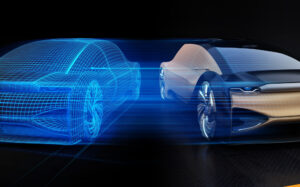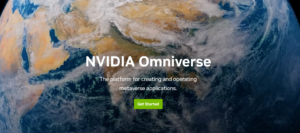
( Chesky/Shutterstock)
NVIDIA held its GTC conference in March, and much of the material related to how the automobile market is reassessing the 300+ brand-new factories it will be developing to produce the next generation of electrical, self-driving automobiles, trucks and flying cars. Generative AI and the metaverse will possibly supply a personalization ability that hasn’t been seen given that the start of the automobile market when automobiles were more customized than line-built. I anticipate this development to enhance consumer retention, consumer complete satisfaction, dependability, and efficiency and to significantly decrease market failures. Other markets will welcome these innovations, too, for comparable factors.
Let’s speak about how generative AI and the metaverse is currently resulting in a huge modification in future vehicle and truck factories and how the associated business will engage more deeply with and end up being much closer to their users.
The Metaverse from Cradle to Tomb
Generally, automobiles are developed as concepts. These concepts are then winnowed down into a number of principles. The principles are made into clay designs and distributed for remark. Models are constructed and required to vehicle programs and checked on personal then public roadways. Focus groups are generated to see if there is a market for the vehicle. This procedure can take control of 5 years, normally does not expect what the competitive market will be when the vehicle is launched, and typically does not have adequate consumer voice throughout the procedure. The outcome is that automobiles offer inadequately as soon as they come out. In addition, throughout line setup, issues are typically found late at the same time which postpones production and sustains otherwise preventable expenses to upgrade and reconfigure the lines. 
The metaverse (mainly NVIDIA Omniverse which is dominant in automobile) is significantly being utilized by a wide array of vehicle makers to not just style and get feedback on the brand-new vehicle, however to practically develop factories and their production floorings to ensure that huge parts of the brand-new or existing factory will not require to be redone and possibly decrease time-to-market substantially.
In addition, the metaverse is being utilized to develop and get feedback on the vehicle, which gets rid of the issues connected with setting up the lines since those issues can now be determined in the metaverse. This enables less pricey corrections must they be required.
A digital twin of the vehicle is developed that enables the purchaser to not just develop the vehicle they desire however enables them to follow the vehicle through the develop procedure and resolve any concerns about the options they made. This digital twin will stay connected to the vehicle. It will assist the user repair some things and allow the user to not just much better find possible issues however assist them repair them if they are remote from a dealership. The vehicle business can follow the life of the car in order to comprehend and resolve points of failure that may otherwise emerge later on and harm its relationship with the user.
Generative AI at the Heart of the Consumer Relationship
These next generation automobiles are slated to have generative AI user interfaces that allow the motorist to speak with their car in natural language instead of packaged and annoying set commands. This conversational user interface has actually currently spread out through Microsoft‘s designer tools and most just recently through Windows, Workplace, and the Edge web browser. Despite the fact that Google was captured sleeping, this user interface must rapidly spread out throughout its platforms, too. This suggests we’ll be surrounded significantly by things that we can utilize natural language to user interface with.
The ramification is that, gradually, vehicle owners will user interface with their vehicle and vehicle business through generative AI and establish more of a collegial relationship with their cars and vehicle business. These AIs will not just assist users find out about their brand-new cars and how to run them, however assist them choose the best car and setup prior to they purchase the vehicle. In addition, I anticipate this will progress to a point where we will initially user interface with our generative automobile AI throughout the purchase procedure and have the ability to use the most effective upselling abilities while stabilizing the requirement to keep a relied on relationship in between the purchaser and the associated vehicle business.
Rather of connecting just when the purchaser has an extremely severe issue or throughout the purchasing procedure, future purchasers will remain engaged through the generative AI with their vehicle business. I likewise anticipate this generative AI experience will not simply remain in the vehicle however will extend into the house and service as users require a more constant AI experience throughout an ever-widening field of items just like we saw with tools like Apple‘s Siri and specifically Amazon Alexa. However vehicle business are currently ending on these third-party tools in favor of their own to welcome their clients and connect them more firmly to the business by dealing with the consumer retention issue.
Finishing Up:
Automotive business seem racing ahead of everybody else to use metaverse and generative AI to their items and factories. However the advantages of this relocation, that include speed to market, less errors, much better dependability, much better efficiency and greater consumer complete satisfaction and consumer commitment, will infect other markets. Generative AI efforts will combine to approach the objective that users will likely choose of having just one generative AI user interface into all their clever items. This recommends future market growths for automobile business that will wish to partner with or purchase into associated markets that will gain from the automobile business’ management as they take advantage of the user’s requirement for a constant AI experience.
In other words, while the metaverse and generative AI will strike the automobile market hard initially, once the advantages are confirmed, they will quickly infect other markets and alter every element of how we style, develop, generate income from and service items and how these business produce and keep a much deeper relationship with clients. 
About the author: As President and Principal Expert of the Enderle Group, Rob Enderle offers local and international business with assistance in how to produce reputable discussion with the marketplace, target consumer requires, produce brand-new service chances, expect innovation modifications, choose suppliers and items, and practice no dollar marketing. For over twenty years Rob has actually worked for and with business like Microsoft, HP, IBM, Dell, Toshiba, Entrance, Sony, USAA, Texas Instruments, AMD, Intel, Credit Suisse First Boston, ROLM, and Siemens.
Associated Products:
Wired vs. Unwired and the Coming Huge Modifications in IoT Provisioning
Covering our Heads Around CES 2023 and Next Generation Applied AI
In the Shadow of the Twitter Acquisition-Layoff Catastrophe: How to Get Ready For Layoffs
